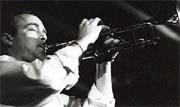
The Dave Douglas New Quintet will perfrom Friday, Feb. 20th in the Memorial Chapel. Tickets are available at the box office.
The Dave Douglas New Quintet performance next Friday Feb. 20 in the Memorial Chapel provides Appletonians with the rare midwestern treat of catching one of the hottest “supergroups” in all of art music midway through its New York-based, meteoric ascendancy through the ranks of creative music.The New Quintet focuses on acoustic jazz (with electronic keyboards) significantly influenced by the early jazz-rock of Miles Davis. Trumpeter Douglas lists as his three main compositional influences classical modernist Igor Stravinsky, jazz giant John Coltrane, and Stevie Wonder. Douglas fuses these influences with a commitment to activism through music.
Expect to hear classically influenced compositions juxtaposed with covers of Bjork or Mary J. Blige; “old school” jazz morphing into new-school hip-hop; and some of the most sensitive, assured riffing there is to be heard giving way to hook-based textures. And, of course, expect to have no idea what will come next.
Indeed, lest the label “supergroup” seem like hyperbole, three of the quintet’s members-trumpeter Douglas, saxophonist and multi-reedist Chris Potter, and pianist Uri Caine-are genredefying bandleaders in their own rights. Potter in particular seems to be horn-du-jour for New York’s creative music scene, augmenting international accolades for his virtuosic solo work with spot-on contributions to groups as diverse acclaimed as the Dave Holland Quintet, Steely Dan, and the Mingus Big Band.
And any Lawrentians who caught Caine’s 2001 Jazz Weekend set might well remember that his spot-on stride, witty standards, and postmodern filtering of Bach and Mahler reveal an artist comfortable with turntables or harpsichords, complex forms or freedom.
Frequent Caine and Douglas collaborator James Genus, on bass, anchors the quintet. Want an idea of Genus’s chops? Well, he played on a Victor Wooten album. That’s just one entry on a sizable discography.
In a music so concerned with texture and transitions between more traditionally “jazzy” settings and the works of hip-hop, Americana, and beyond, Clarence Penn is the drummer for the job. Two recent albums were reviewed quite promisingly.
What about Douglas? If there is a single overarching theme in Douglas’s particularly prolific compositional and performing output, it’s the balance of free improvisation with through-composed work. And his chops? Douglas plays the horn with a robust tone full of assured technique, weaving his way through a web of jazz tradition, European art music, and modern pop.
Those listeners expecting foot-tapping bebop or agreeable standards aren’t likely to be disappointed, but surely will be surprised. However, the group tours in support of its most recent recording for RCA, Strange Liberation, a collaboration with 2002 Lawrence University jazz series artist Bill Frisell on guitar. This most recent album, whose title comes from Rev. Dr. Martin Luther King’s quip that US troops were “strange liberators” in Vietnam when racial unrest still roiled back home, channels the boldness of the New Quintet’s first release (The Infinite) through Frisell’s quiet, countrified minimalism.
Friday’s performance promises to yield aural harvests to open-eared fans of pop, jazz, and classical alike, when a tasty slice of New York style swings through town.
